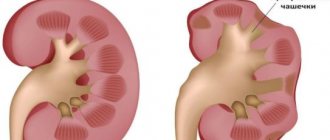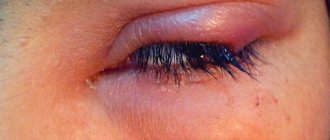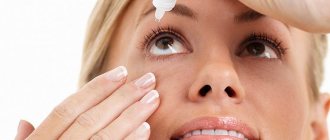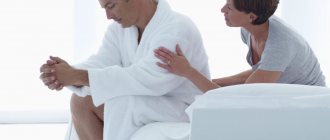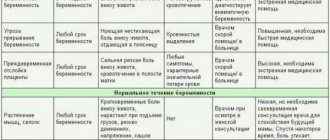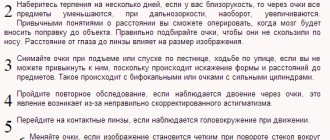Gallbladder diseases
Cholelithiasis
In cholelithiasis, stones of various origins form in the gallbladder and ducts.
The reasons are poor nutrition, disruption of the digestive process, disruption of the formation and outflow of bile, and metabolic disorders. Symptoms: colic, bitterness in the mouth, nausea, vomiting, hyperthermia. Stones damage the walls of the gallbladder and can block the bile duct.
Cholecystitis
This is an inflammation of the gallbladder, often of a bacterial nature. There are acute and chronic cholecystitis. The reasons are physical inactivity, lack of physical activity, unbalanced diet, nutritional disorders, disruption of the sphincter of Oddi and gall bladder, congestion in the gall bladder. The gallbladder becomes deformed due to the growth of connective tissue, the bile becomes thicker, and the risk of stone formation increases. With cholecystitis, bitterness appears in the mouth, vomiting bile in the morning, flatulence, spasms, colic, itching, loss of appetite, up to refusal, diarrhea or constipation; in the acute form, hyperthermia, weakness, severe pain in the right side.
Cholangitis
This is an inflammatory disease of the bile ducts. The reasons are disruption of the biliary tract, stagnation of bile and its infection. It manifests itself as paroxysmal pain in the right hypochondrium with irradiation to the scapula and neck. Often the patient complains of fatigue, loss of appetite, wave-like increase in temperature due to intoxication, headache, and itchy skin. Complications may occur - liver abscess, sepsis, toxic shock.
The influence of alcohol
After drinking alcohol, if you feel pain in your kidneys, you need to go to the hospital.
Only a doctor, after a full examination, will be able to prescribe the correct medications and prevent the development of dangerous processes.
The very first thing is to give up alcohol.
It will take only 2 months for the kidneys to fully resume proper functioning. Doctors generally prescribe specific treatments for kidney disease. You need to follow a diet for kidney pain, do not eat fatty or salty foods, and often walk outside. And if you follow all this, you can completely restore kidney function.
For example, a decoction based on the leaves and buds of birch, black elderberry, oregano, lingonberry leaves, nettle, juniper, celery root, lemon balm, dill seeds, sage.
And to crush kidney stones, you can drink decoctions of parsley and knotweed. For infusion you need up to 300 grams of different herbs.
Liver diseases
Hepatitis
This is an inflammatory disease of the liver. Hepatitis is classified into infectious (usually viral), toxic, autoimmune and ischemic. Manifested by jaundice, weakness, pain in the right hypochondrium.
Cirrhosis of the liver
This is a chronic disease that is characterized by liver damage and the disease progresses. With cirrhosis, the number of functioning liver cells decreases and they are replaced by connective tissue. Liver failure develops. With cirrhosis, the patient complains of increased fatigue, loss of appetite, nausea, vomiting blood, blood in the stool, dull pain in the right side of the abdomen, discoloration of the skin and sclera in an icteric shade, the patient loses weight, loses weight sharply, the abdomen increases in size due to ascites. Hepatic encephalopathy occurs, in the last stage - hepatic coma. With viral cirrhosis, there is a high risk of developing liver carcinoma.
Liver failure
This is a severe dysfunction of the liver, the cause is the damaging, toxic effects of chemical compounds, including alcohol. It manifests itself as yellowness of the skin and sclera, increased fatigue, weakness, loss of appetite, ascites, hematomas, bleeding, hepatic encephalopathy, and high mortality.
Liver abscess
A liver disease of an infectious nature, characterized by the accumulation of pus in the liver tissues and enlargement of the liver. Penetration of a bacterial infection occurs through the bile ducts, through the portal vein, through the hepatic artery, or when the gallbladder ruptures or with liver injuries. There is an increase in temperature to 39-40 C, aching pain in the right hypochondrium, loss of appetite up to complete refusal to eat, asthenia, and a sharp decrease in body weight.
Diagnostics
If your kidneys systematically hurt after sleep, this may indicate serious abnormalities in the human body. Therefore, it is very important to carry out diagnostic procedures in a timely and professional manner, on the basis of which a correct diagnosis can be made.
To identify disorders in the functioning of the kidneys, the patient is first prescribed a general and special urine analysis. Based on the results of these studies, markers of inflammation are identified, as well as changes in the organ. You must take tests immediately after waking up and do not eat anything. This is necessary to avoid increased toxicity caused by food. For the same purpose, a general and biochemical blood test is prescribed.
Tests must be taken on an empty stomach
But as medical practice shows, laboratory tests alone are unfortunately not enough to make a diagnosis. In addition to them, instrumental ones are also needed. The most effective of them are:
- ultrasonography;
- cytoscopy;
- renography;
- urography;
- angiography;
- scintigraphy.
Only after the doctor has the results of all the studies performed will he be able to accurately make a diagnosis, as well as find out the cause of the disease and prescribe an effective and, in each case, purely individual treatment.
Kidney diseases
Pyelonephritis
Inflammatory disease of the kidneys of a bacterial nature. Pyelonephritis is divided into acute and chronic, and is more common in women. Symptoms: fever, nagging pain in the lower back, swelling, difficulty urinating, urine color changes, may be mixed with blood. In acute pyelonephritis, body temperature rises. Treatment is carried out by a nephrologist.
Urolithiasis A kidney disease with metabolic disorders, initially sand is formed, which forms into stones. When stones pass into the ureter, the ducts are blocked, which causes renal colic.
Symptoms: dull or sharp pain in the lower back, itching when urinating, change in urine color, frequent urge, renal colic, hyperthermia.
Causes of pathology
Why do my kidneys hurt in the morning?
This question is asked by many people who are concerned about similar symptoms. Of course, only the attending physician can answer this question unambiguously after conducting a series of examinations. The most likely factors provoking these symptoms are:
- inflammation occurring directly in the kidneys;
- development of pathologies in other human organs;
- complications after surgery;
- the development of pyelonephritis, which subsequently has a negative impact on the entire body;
- renal failure, which could be caused by long-term use of medications;
- the formation of stones in the kidneys as a result of salt deposition and disruption of the water-salt balance;
- prolapse of the kidney or nephroptosis - this pathology mainly occurs in the human body as a result of lifting heavy objects and receiving various injuries;
- malignant or benign neoplasms that cause pain during the growth of foreign cells;
- enlargement of the renal pelvis or calyx, resulting in urinary disturbances.
There are many reasons that cause pain in the kidney area.
From all that has been said above, we can conclude that at the first signs of pain in the kidneys that appear in the morning, you need to immediately consult a doctor. This is explained by the fact that timely diagnosis and professionally prescribed treatment will help get rid of the disease and prevent the risk of complications, which, in some cases, can even cause death. It is very important to closely monitor your health and follow a number of simple rules in order to eliminate the risk of developing pathologies.
Prevention
In order to become a person who has no idea how much your kidneys hurt in the morning, you need to follow a number of certain rules and follow the recommendations of specialists. First of all, you need to take care to prevent hypothermia. In addition, you need to give up all bad habits. This applies not only to drinking alcohol, but also to smoking. Preference should be given to proper and balanced nutrition, as well as leading a healthy lifestyle.
To avoid kidney pain, you need to give up bad habits
Among other things, to ensure normal functioning of the kidneys, you need to ensure that you drink plenty of fluids. To do this, a person needs to drink about three liters of water per day.
The diet must include fruits, vegetables, and greens. You should avoid systematically consuming fatty, smoked, salty and fried foods, and also exclude carbonated drinks, chocolate and coffee from your diet. Ideally, the food a person eats is steamed or simply boiled.
Ideally, systematically undergo examinations as a preventive measure. This way, you can identify the disease at an early stage and thereby eliminate the risk of complications.
Pain in the lumbar region should under no circumstances be ignored, especially if it manifests itself systematically. In such a situation, you need to immediately contact a medical institution to conduct an examination and identify the cause, as well as professionally prescribe a more suitable method of therapy.
Ways to eliminate pain
In most cases, treatment of renal pathologies is carried out with the help of medications, which are selected individually in each case. But despite this, in some situations the only option is surgical intervention. This mainly applies to advanced stages of the disease.
In some situations, the only option is surgical intervention.
At the initial stage, it is much easier to cope with the disease and medications are selected for this. For the treatment of kidney-related diseases, the basis is the use of hepatoprotective drugs, which are aimed at removing toxins from the body. If a patient is diagnosed with an infectious disease or pyelonephritis, treatment is not complete without taking antibiotics, anti-inflammatory drugs and drugs to improve blood flow.
For urolithiasis, medications can also be used to soften them and subsequently remove them. But here the situation is considered in each case purely individually, depending on the size of the stones and their composition. In most cases, to combat urolithiasis, surgical intervention is used or the patient is prescribed their crushing. Surgery cannot be avoided in cases where the patient develops tumors or cysts.
If your kidneys hurt in the morning, then under no circumstances should you self-medicate, as this can lead to serious complications and the disease progressing to a chronic stage.
How to eliminate pain?
Some types of pathologies are treated with medication. Some kidney diseases are treated with medications. Some diseases and cases require only surgical intervention and maintenance therapy in the form of tablets. Sometimes, medications are replaced with prescriptions from traditional medicine, but after prior consultation with a doctor.
Selection of medications
Not advanced diseases can easily be treated with medication. The basis of therapy for any ailment is hepatoprotective agents and substances that remove toxins. In the treatment of pyelonephritis and other infectious lesions of the organ, strong antibiotics, anti-inflammatory drugs and drugs to improve blood flow are prescribed. Medicines are not used to remove stones due to their uselessness. In this case, either surgery or laser crushing of stones is used. Surgery is required for tumors and cysts.
Folk remedies: how effective?
For treatment, infusions and herbal teas from elderberry, juniper, mint, burdock, plantain and sage are used. Calendula is added to tea as an anti-inflammatory component. You can also be treated with food: it’s easier to focus on pumpkin, rose hips, beans, walnuts or watermelon. The following recipes are used for various ailments:
Lingonberry infusion will alleviate the patient's condition.
- Medicinal juice. Mix celery, carrot and beet juice in a ratio of 1:3:2 and take 3 cups per day.
- Lingonberry infusion. 1 tbsp is poured. l. lingonberry fruits and leaves with a glass of boiling water and infuse for 1 hour. This infusion is enough for 4 doses per day, 50 ml each.
- Knotweed. A tablespoon of dried herb is poured into a thermos with a glass of boiling water and left there for 1-2 hours. You need to drink the infusion 2 times a day, a quarter glass. This recipe helps soften the stones and gradually remove them with sand from the kidneys.
Treatment with traditional methods is only an addition to tablets.
Cystitis
Cystitis is an inflammation of the bladder due to the penetration of microbes . Representatives of the fair sex are more susceptible to this disease, since their urinary canal is shorter than that of men and it is easier for infection to penetrate inside. Bladder disease interferes with the functioning of the entire system, so pain may be felt in the kidney area.


